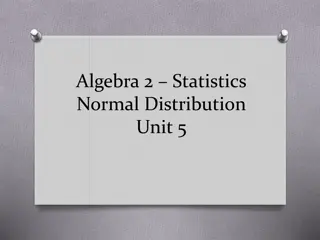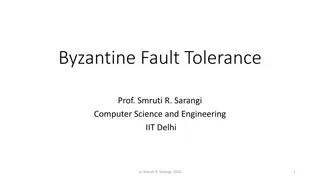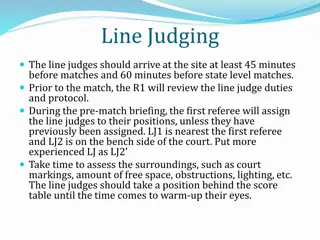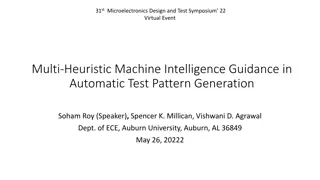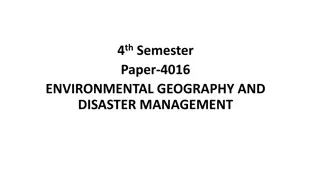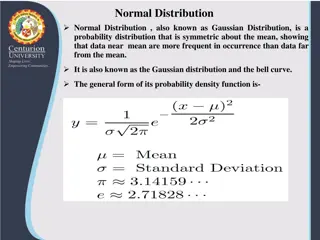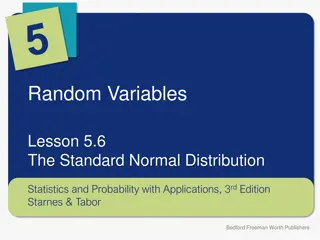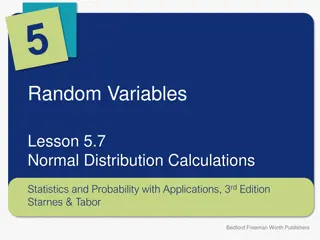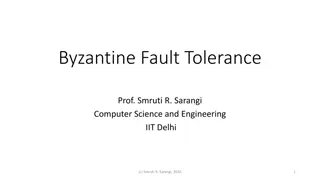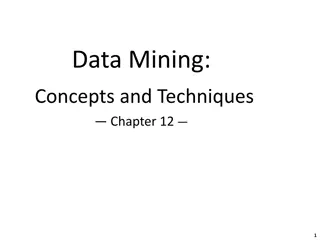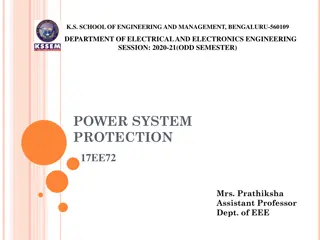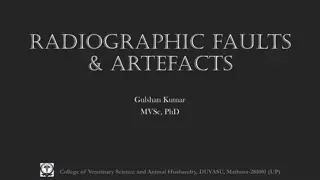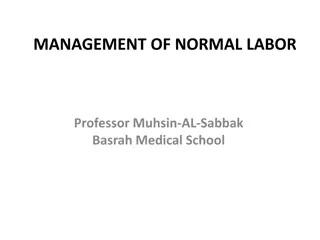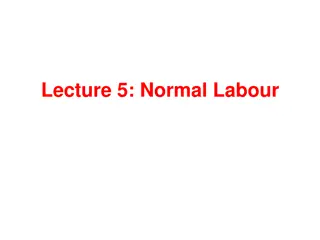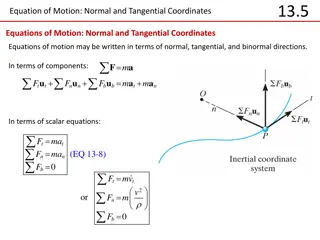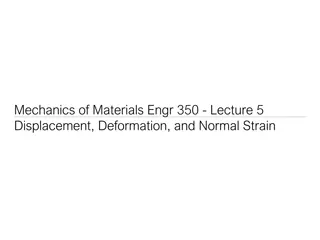DELL LAPTOP MOTHERBOARD REPAIR
Dell laptop motherboard repair involves diagnosing issues, inspecting components for damage, testing and isolating faults, repairing or replacing faulty parts, updating firmware, performing functional tests, ensuring quality, and communicating with the customer throughout the process.
1 views • 5 slides
Understanding Normal Distribution in Statistics Education
Lesson resources for teachers to teach students about analyzing and understanding normal distribution in statistics. Includes learning standards, agenda, presentation, vocabulary activities, and additional resources. Emphasizes using mean and standard deviation to fit data to a normal distribution,
10 views • 23 slides
Understanding Normal Conditions of Use for New Propulsion Technologies in Vehicles
Explore the concept of normal conditions of use for vehicles with new propulsion/charging technologies. Learn how to assess and define normal conditions, operating modes, worst case scenarios, and overview of current technologies. Discover the approach to measure normal conditions and testing requir
1 views • 8 slides
What Does the PARKTRONIC Inoperative, See Owner's Manual Message Mean for Your Mercedes
Learn what \"PARKTRONIC Inoperative, See Owner's Manual\" means for your Mercedes-Benz. This message indicates a malfunction in the parking assistance system, potentially due to sensor issues or electrical faults. Prompt attention is crucial to ensure safety and functionality. Follow steps outlined
1 views • 23 slides
Best Ceiling Fans in Bondi Junction
Are you looking for the Best Ceiling Fans in Bondi Junction? Then contact KJB Electrical Contractors. They provide their clients include hot water, power faults, lighting, ceiling fans, safety switches, switchboards, EV charger installations, smoke alarms, and more. They are also available 24\/7, fo
0 views • 6 slides
Understanding Byzantine Fault Tolerance in Distributed Systems
Byzantine fault tolerance is crucial in ensuring the reliability of distributed systems, especially in the presence of malicious nodes. This concept deals with normal faults, crash faults, and the challenging Byzantine faults, where nodes can exhibit deceptive behaviors. The Byzantine Generals Probl
0 views • 29 slides
Normal Flora of Human Body
Normal flora, comprising bacteria and fungi, are beneficial residents of specific body sites like the skin, colon, and vagina. These organisms, known as commensals, play a vital role in maintaining a healthy microbial balance. The internal organs are usually sterile, while different types of normal
2 views • 16 slides
Guide to Line Judging in Volleyball Tournaments
Learn the essential duties and protocols of a line judge in volleyball tournaments, from arriving early to signaling faults confidently. Find out about pre-match briefings, warm-up preparations, and handling timeouts effectively. Explore tips for positioning, signaling, and staying focused during ga
0 views • 14 slides
Multi-Heuristic Machine Intelligence for Automatic Test Pattern Generation
The 31st Microelectronics Design and Test Symposium featured a virtual event discussing the implementation of multi-heuristic machine intelligence for automatic test pattern generation. The presentation covered motivation, modus operandi, experimental results, conclusions, and future works in the fi
1 views • 17 slides
Understanding Earthquakes: Causes and Impacts Explained
Earthquakes are natural events caused by the release of energy along faults in Earth's crust. Tectonic earthquakes, the most common type, occur due to movements of tectonic plates. Volcanic earthquakes and human-induced earthquakes also exist, each with specific triggers. Earthquakes are highly dest
0 views • 12 slides
Understanding Faults in the Earth's Crust
Stresses in the earth's crust can lead to the formation of faults, where rocks are displaced due to relative movement. Faults can vary in size and shape, with different types such as normal faults. Movement along fault planes can be either translational or rotational. This classification helps in un
1 views • 12 slides
Understanding Earthing Transformers in Power Systems
Equipments in power systems operate under variable complex stresses, leading to unavoidable faults despite careful planning. Earthing transformers play a crucial role in reducing potential stresses during faults by providing a neutral grounding point. By effectively grounding circuits, these transfo
1 views • 30 slides
Understanding Process Costing in Manufacturing Industries
Process costing is a widely used method in mass production industries like steel and chemicals. It involves accumulating costs process-wise for standardized products resulting from sequential operations. Essential characteristics include continuous production, standardized products, and handling nor
1 views • 18 slides
Understanding Normal Distribution and Its Business Applications
Normal distribution, also known as Gaussian distribution, is a symmetric probability distribution where data near the mean are more common. It is crucial in statistics as it fits various natural phenomena. This distribution is symmetric around the mean, with equal mean, median, and mode, and denser
1 views • 8 slides
Understanding the Standard Normal Distribution in Statistics
Exploring the significance of normal distributions in statistics, this lesson covers the 68-95-99.7 rule, using Table A to find probabilities and z-scores, properties of normal curves, and the standard normal distribution. Key concepts include the mean, standard deviation, and how to standardize var
4 views • 9 slides
Understanding Normal Distribution Calculations in Statistics
Exploring normal distribution calculations in Statistics involves calculating probabilities within intervals and finding values corresponding to given probabilities. This lesson delves into the application of normal distribution to determine probabilities of scoring below a certain level on tests an
1 views • 13 slides
Understanding Earthquakes and Volcanoes: a Comprehensive Overview
Earthquakes are vibrations in the ground caused by movement along faults in the Earth's lithosphere. They occur mostly near plate boundaries and are difficult to predict. Different types of faults and seismic waves play a crucial role in understanding these natural phenomena. Seismologists study ear
0 views • 19 slides
Understanding Normal Distribution in Probability
Explore the properties and characteristics of the normal distribution, including the mode, symmetry, inflection points, and the standard normal distribution. Learn how to use standard normal tables to find probabilities and areas under the curve. Practice using examples to calculate probabilities ba
1 views • 35 slides
Understanding Byzantine Fault Tolerance: A Comprehensive Overview
Byzantine Fault Tolerance (BFT) is a critical concept in computer science, addressing faults in distributed systems. This summary covers the types of faults (normal, crash, Byzantine), implications of Byzantine faults, Byzantine Generals Problem, impossibility results, and the complexity of solving
3 views • 29 slides
Comprehensive Guide to Transformer Buchholz Relay by Prof. V. G. Patel
Understanding the significance of Buchholz relay in protecting transformers from incipient faults that can develop into serious issues. Developed by Max Buchholz in 1921, this gas-operated device detects faults such as core insulation failure, short-circuited core laminations, and loss of oil due to
3 views • 14 slides
Understanding Outlier Analysis in Data Mining
Outliers are data objects that deviate significantly from normal data, providing valuable insights in various applications like fraud detection and customer segmentation. Types of outliers include global, contextual, and collective outliers, each serving distinct purposes in anomaly detection. Chall
0 views • 44 slides
Understanding the Normal Microbial Flora of the Human Body
The normal microbial flora, also known as the indigenous microbiota, inhabit various areas of the human body such as the gastrointestinal tract, respiratory tract, genitourinary tract, and skin. They play a crucial role in maintaining health and can re-establish themselves when disturbed. While resi
0 views • 22 slides
Understanding and Managing Normal.dotm in Microsoft Word
Learn about Normal.dotm in Microsoft Word, the default template for new documents. Find out how to locate, create, modify, and deal with corrupted Normal.dotm files. Explore the importance of Normal.dotm in customizing your Word documents efficiently.
0 views • 19 slides
Understanding the Normal Probability Curve
The Normal Probability Curve, also known as the normal distribution, is a fundamental concept in statistics. It is symmetric around the mean, with key characteristics such as equal numbers of cases above and below the mean, and the mean, median, and mode coinciding. The curve's height decreases grad
0 views • 10 slides
Understanding Normal and Abnormal Behavior: Perspectives and Definitions
Normal behavior varies from person to person and society, influenced by individual preferences and societal norms. Abnormal behavior is characterized by an inability to function effectively or personal discomfort. The concept of normality and abnormality in psychology raises complex questions about
2 views • 8 slides
Understanding Normal Forms in Propositional Logic
Explore the concept of normal forms in propositional logic, where each formula has a unique truth-value function. Learn about equivalence of formulas, determining normal forms, and canonic forms like Disjunctive Normal Form (DNF) and Conjunctive Normal Form (CNF). Discover how to find canonic forms
1 views • 22 slides
Understanding Power System Protection and Faults in Electrical Engineering
Protective schemes in power systems, including circuit breakers, transducers, and relays, aim to isolate faulty sections to prevent severe damage due to fault currents. Various causes of faults are discussed, such as overvoltage, lightning strokes, environmental factors, and accidents. The types and
0 views • 8 slides
Understanding Normal Parturition: The Stages and Processes
Normal parturition, also known as childbirth, involves several stages including uterine contractions, cervix dilatation, fetal positioning, and the weakening of the placental connection. The process gradually prepares the birth canal for delivery, with the fetus assuming a specific position for birt
1 views • 19 slides
Understanding Radiographic Faults and Artefacts in Veterinary Imaging
Learn about radiographic faults and artefacts in veterinary radiography, including technical errors like motion artefacts, dark radiographs, gray non-contrast images, and light radiographs, as well as processing errors such as dark spots and white spots on radiographs. Discover the causes of these e
0 views • 12 slides
Understanding Plate Tectonics and Earth's Crust
Explore the differences between oceanic and continental crust, the distinctions of lithosphere and asthenosphere, the dynamics of convergent and divergent boundaries, as well as the concepts of folding and faulting in geological formations. Delve into the characteristics of oceanic crust versus ocea
0 views • 10 slides
Understanding Durability and Integrity in Data Storage Systems
Durability and integrity are crucial aspects of data storage systems. Durability ensures data survives faults like crashes and power loss, while integrity ensures data correctness in the face of faults. Disk data is durable due to surviving power loss, and has integrity through explicit and complex
0 views • 24 slides
Understanding Faults in Electrical Systems
In electrical systems, faults are barriers that disrupt the flow of current, leading to abnormal conditions like short circuits or open circuits. Faults can cause harm to equipment and personnel, affecting system operation and creating safety hazards. Common types of faults include open circuit faul
0 views • 53 slides
Comprehensive Guide to the Management of Normal Labor by Professor Muhsin-AL-Sabbak
Understanding the management of normal labor is crucial for healthcare professionals. This comprehensive guide covers the definition of normal vaginal delivery, diagnosis of labor, stages of labor, phases of labor, and the use of tools like partogram and cardiotocography to monitor progress. Profess
0 views • 9 slides
Understanding Normal Labour in Pregnancy
Labour is the natural process of expelling a mature foetus from the uterus. Criteria for normal labour include spontaneous expulsion of a single, mature foetus within a reasonable time frame without complications. Various theories explain the onset of labour, such as hormonal factors and mechanical
0 views • 35 slides
Troubleshooting Blown Fuse in URD System
Understanding and isolating transformer faults in an Underground Residential Distribution (URD) system is crucial for restoring power. This content outlines the steps to troubleshoot a blown fuse, inspecting transformers for faults, and using techniques like a Hi-Pot tool for diagnosis. The process
0 views • 11 slides
Understanding Plate Tectonics and Earth's Surface Features
The study of plate tectonics reveals how the Earth's crust is divided into tectonic plates, leading to various types of plate boundaries like divergent, convergent, and transform. These movements result in earthquakes, volcanic eruptions, and landform changes such as folding and faulting. Different
0 views • 15 slides
Byzantine Faults and Consensus on Unknown Torus
The discussion revolves around achieving consensus in the presence of dense Byzantine faults on an unknown torus. Various challenges and impossibility theorems are explored, highlighting the complexities of reaching an agreement in such fault-prone environments. The content delves into the limitatio
0 views • 23 slides
Equations of Motion in Normal and Tangential Coordinates
Equations of motion can be expressed in terms of normal, tangential, and binormal directions. The normal and tangential components play crucial roles in describing the motion of an object. Through scalar equations and component representations, these equations help analyze forces and acceleration in
0 views • 8 slides
Understanding DA Form 5988-E for Equipment Maintenance
The DA Form 5988-E is divided into three sections: Equipment Data, Parts Requested, and Maintenance Faults. It is essential for identifying a vehicle's status, tracking parts orders, and recording faults. Regular updates and proper documentation are crucial to ensure the form reflects the current co
0 views • 16 slides
Understanding Displacement, Deformation, and Normal Strain in Mechanics of Materials
Displacement and deformation in materials play a crucial role when loads are applied, leading to normal strain. This lecture discusses the concepts of displacement, deformation, and strain, covering topics such as types of strain, strain units, normal strain calculations, and the orientation of norm
0 views • 7 slides

